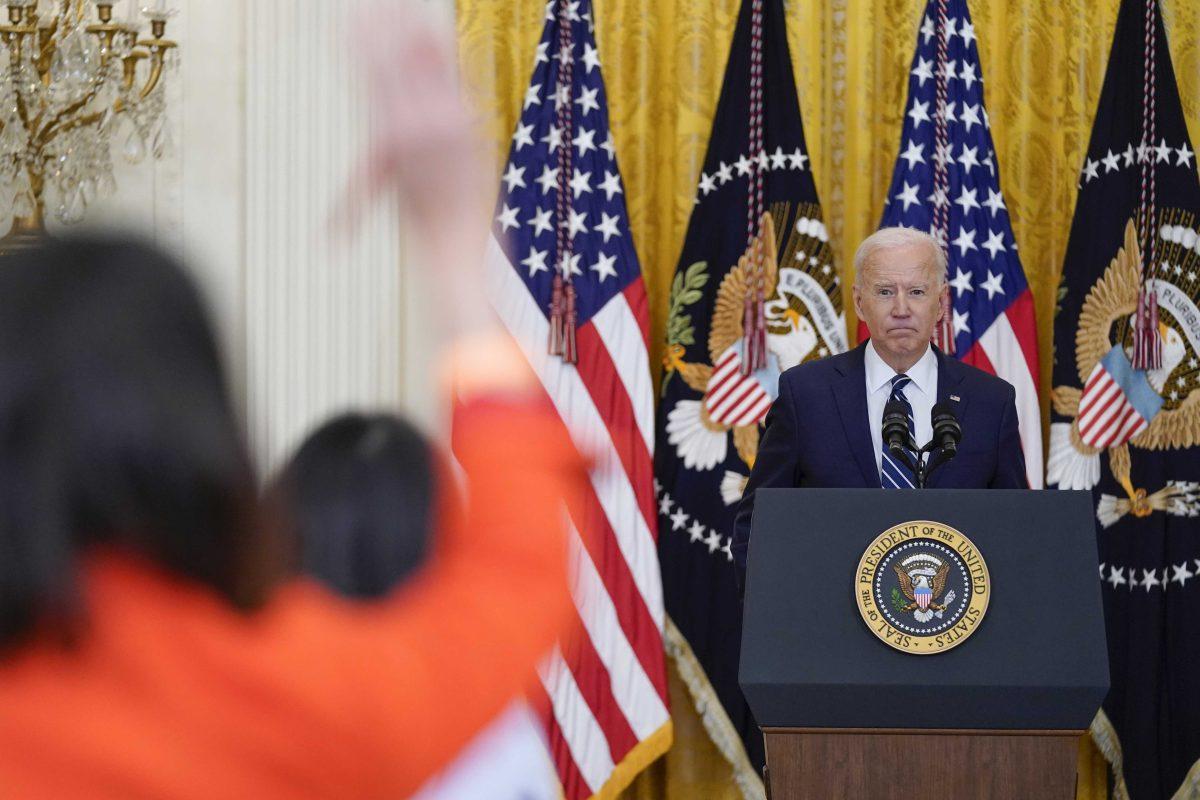President Joe Biden signed an executive order March 8 directing the Department of Education to review “all of its existing regulations, orders, guidance and policies” related to sexual violence in education within 100 days, signaling there could be changes to the 2020 Title IX regulations that went into effect in August of last year.
Secretary of Education Miguel A. Cardona will “issue new guidance as needed” on how schools and colleges should enforce Title IX rules, and “consider suspending, revising or rescinding” elements of the current regulations that are “inconsistent” with the Biden administration’s approach to Title IX, according to the order.
“It is the policy of my administration that all students should be guaranteed an educational environment free from discrimination on the basis of sex, including discrimination in the form of sexual harassment, which encompasses sexual violence,” the order read.
In May 2020, Biden vowed to put a “quick end” to the new Title IX regulations under the Trump administration, which he said “gives colleges a green light to ignore sexual violence and strip survivors of their rights.”
Those changes, implemented by former Education Secretary Betsy DeVos, were the first major regulatory changes to Title IX since 1975 and the first change to deal explicitly with sexual harassment. The regulations were introduced in May and went into effect on August 14 for all federally funded colleges and universities.
Some of the most significant changes included requiring colleges to hold cross-examinations of both parties in live hearings led by institution officials in cases of formal sexual harassment allegations, limiting sexual misconduct that occurs off campus from Title IX oversight and establishing formal definitions of sexual assault and harassment.
Trump and proponents of the regulations said the changes boosts the rights of those accused of sexual misconduct and improves due process on college campuses, but victims’ advocates, like Tigers Against Sexual Assault co-President Angelina Cantelli, said mandatory hearings and cross-examinations would retraumatize victims and discourage others from reporting cases of sexual misconduct.
“Allowing them to be cross examined by a representative of the abuser is damaging and it’s basically putting their story on the line and operating under the presumption that they are lying and you’re trying to catch them in that lie,” Cantelli said. “If we want survivors to report what happened to them and we want to have a true idea of what’s going on at our universities, we have to get rid of those kinds of things.”
Cantelli is also the deputy chief of staff of Student Government and a member of SG’s Sexual Violence Prevention Committee. Following the Husch Blackwell report, she spoke at a Semate Select Committee on Women and Children hearing on how Louisiana universities have handled Title IX cases and has been a central voice in the student protests against the University’s mishandling of sexual assault allegations.
Currently, universities are required to have “reasonably prompt” periods for carrying out each step in the Title IX complaint process. Cantelli said she’d like to see universities be required to complete investigations within a specific time frame. She also said Title IX offices should have jurisdiction over more cases, such as complaints that take place on study abroad trips.
LSU higher education professor Joy Blanchard wrote an op-ed in Inside Higher Education about the regulations in May 2020. She emphasized the importance of focusing resources and effort on prevention rather than punishment.
“Universities can spend upwards of $1 million in providing the staff, training and infrastructure to comply with regulatory mandates such as Title IX,” Blanchard said. “Yet I think that money can be better spent on innovative programming that seeks to eliminate campus sexual assault.”
Blanchard told the Reveille she’d recommend the Biden administration leave Title IX regulations as they are since university administrators usually don’t have the necessary legal training to delegate cases of sexual misconduct.
“These are very complicated legal issues that are usually left to a judge and a jury to decide with very specific criminal procedure guidelines,” Blanchard said. “I would encourage [Biden] to put money into programming at the middle school, high school and college level to talk about consent, bystander intervention and social norming.”
“I think everyone would agree it would be better to work on preventing these instances from happening than being so worried about the Department of Education assessing every nuance of how the campus hearings go.”
It took nearly a year and a half for Trump’s Department of Education to review more than 124,000 public comments on the issue and finalize the proposed regulations. Formally changing them again would require the same lengthy process, Blanchard said.
Cantelli said not all aspects of the Trump regulations were bad, like the establishment of formal definitions of sexual assault and survivors’ sexual history being irrelevant to investigations.
“I would really encourage the Biden administration to listen to the voices of students when it comes to these changes, especially with everything that’s happened at LSU,” Cantelli said. “Having feedback from students and valuing their voice about what they’ve experienced in the Title IX process on their campus is going to be huge in making this an effective law.”
Title IX changes could be coming under the Biden administration
By Josh Archote
April 4, 2021
President Joe Biden speaks during a news conference in the East Room of the White House, Thursday, March 25, 2021, in Washington. (AP Photo/Evan Vucci)







